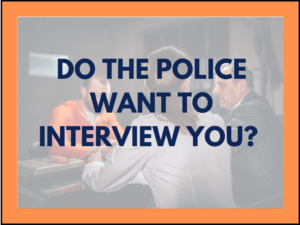Why you should never underestimate the value of legal representation during a police interview
After police have investigated a criminal matter, the police will give you an opportunity to give your version of events. Critically, police often offer this after they have formed a view on if you should be charged or not. Overwhelmingly, all a Electronic Record of Interview of "EROI" does is give the police more evidence, it is highly unlikely you will be able to “explain your way” out of the situation. Police are skilled at pulling information from you often, aside from the formalities it will feel like a friendly conversation not an interrogation.
In Queensland, going to a police interview can be nerve-wracking and daunting, especially if you've never done it before. Understanding your legal options and the procedure will help you feel more prepared and in charge of the situation.
You should be informed of your rights to remain silent and to have legal representation present if you are requested to attend a police interview in Queensland. It is generally a good idea to use these rights, especially if you are under investigation for a crime or are at a loss for words.
You might think about getting legal counsel from a criminal defense lawyer before the interview. A lawyer can provide you advice on how to manage the issue and assist you in understanding your rights and the legal ramifications of the interview.
The police officer conducting the interview will ask you a number of questions during the interview. While it's crucial to pay close attention to each question and give an honest response, you shouldn't feel compelled to share any more details than are absolutely essential. Say something if you are unclear about a question or don't comprehend it. You have the right to end the interview at any time.
During the interview, it's also critical to be conscious of your body language. You can show your honesty and collaboration by making eye contact, speaking clearly, and keeping composed. On the other side, avoiding eye contact, fidgeting, or coming off as tense could be interpreted as lying or evading.
When the police warn you that what you say can be used in evidence against you, often this means your record of interview may be played to a jury at your trial.
Don't gamble away your freedom and rights.
Make sure you have a lawyer with you if you're ever asked to take part in a police interrogation so they can represent your best interests. To discuss your alternatives and make sure you are appropriately represented, get in touch with one of our skilled criminal defence lawyers before you hand the police the missing bit of evidence that results in a conviction.
At Interview - a suammry of what you can expect
Police getting ready for the interview
The police will take you into an interview room at the police, most interview rooms have a. “L” shaped table where all people sit on the same side and the interview is recorded both in audio and visual from the other. Sometimes the officers might take a moment or two to set up the recording devices. Once the recording is started, everyone in the room will be asked to identify themselves including any lawyers or support people in the room.
The Interview - Rights and Cautions
Police will ask a few general non-specific questions such as your level of education, if you can read and write, if you are under the effects of any medications or substances. Police then explain your rights and caution you about the consequences of giving an interview. The police must comply with the very strict legal protections at this stage.
Your Decision – Do you give an interview?
You are then asked if you wish to give an interview. At this point your lawyer may ask the police to give some information about what they are investigating before giving you advice about the pros and cons of giving an interview.
You then decide if you wish to give an interview and your lawyer will give you advice as to what they think is the best option for you in the situation.
If you do give an interview, the police will ask you questions about what you know, your involvement with and whereabouts connected with the matters they are investigating. It is important to remember, at this stage of the investigation the police likely have enough to charge you and the answers you give the police may just be further supporting their case.
If you do start giving an interview, you have the right not stop the interview or not answer questions the police are asking you.
After the interview of refusal
One the four things is likely to happen after the interview:
- Released without being charged.
- Charged and issued a notice to appear (a date you have to attend court).
- Charged and placed on watch house bail – where you are on bail and must attend court on the date set by the officer and conditions you must comply with.
- Charged and remanded in custody (you may wish to make an application for bail at court the following day)
Attending a police interview in Queensland can be a daunting experience, but it is important to remember that you have rights and that you should not hesitate to seek legal advice if you are unsure about how to proceed. By understanding the process and being prepared, you can feel more confident and in control during the interview, having a Solicitor from Murray Torcetti lawyers can help you navigate the situation and place you in the best position to defend any possible charges.
Don't take any chances with your rights and freedom. If you are ever asked to participate in a police interview, make sure you have a lawyer present to protect your interests. Contact Murray Torcetti Lawyers to have an experienced criminal defence lawyer today to discuss your options and ensure that you are properly represented.


